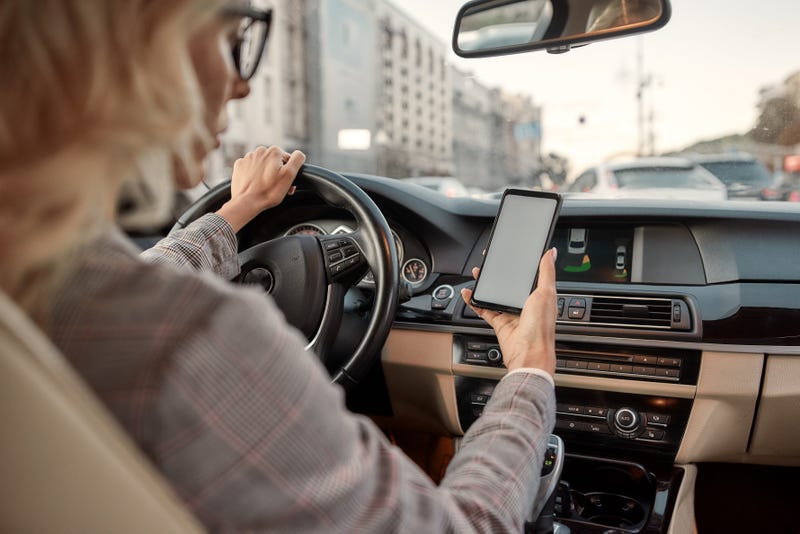
(WWJ) -- WIth increasing numbers of COVID-19 vaccinations and decreasing pandemic restrictions on the near horizon, AAA says traffic volumes are about to pick up in a big way.
And that means more distracted drivers will be on the road, according to the auto club group.
AAA is reminding drivers about the importance of focusing on the road ahead and not on smartphones or other distractions during Distracted Driving Awareness Month.
In 2019, distracted driving crashes killed 3,142 people in the United States -- nine deaths per days -- according to the National Highway Traffic Safety Administration. That was a 10-percent increase from 2018 when data showed 2,839 deaths caused by distracted driving. Of those killed in crashes reported as involving a distracted driver, over 17 percent (532) were between the ages of 25-35.
In Michigan alone, there were 64 fatal crashes involving a distracted driver, resulting in 71 deaths in 2019, according to NHTSA.
“Distracted driving remains a growing traffic safety problem nationwide,” AAA spokesperson Adrienne Woodland said in a statement. “Any distraction, whether it be texting or talking to a passenger, could be enough to cause a crash. AAA strongly urges drivers to focus on what’s most important, that’s the road in front of them.”
AAA says the top three risky driver distractions are mobile phone use, in-vehicle technology and other passengers in the vehicle.
The auto group says drivers who use their cellphones behind the wheel have chosen to ignore the message that it’s extremely dangerous. In 2019, the AAA Foundation for Traffic Safety conducted a nationwide survey which found:
Most drivers (96 percent) believe typing or reading on a hand-held cellphone while driving to be very or extremely dangerous.
Unfortunately, some of them do it anyway. Thirty-nine percent admitted to reading and 29% admit to typing on a smartphone at least once while behind the wheel within the past month.
Using your phone while in motion isn’t the only risk. Checking your phone at the stoplight can be risky too, AAA says. Research found that drivers can experience a “hangover effect” where the mind stays distracted for up to 27 seconds after using smartphones or voice-to-text vehicle infotainment systems to send text messages, make phone calls or update social media. In other words, once that light turns green, your mind may still be focused on your phone and not on the road.
“The bottom line is, if your mind is not focused on driving, you’re unable to properly react to what’s happening on the road in front of you. That puts other drivers, bicyclists, and pedestrians at risk,” Woodland said.
There are currently a trio of House Bills -- 4277, 4278 and 4279 -- pending before the Michigan House of Representatives that would implement what AAA calls “long overdue improvements to Michigan’s distracted driving laws.”
These bills deal with a variety of issues, including banning the use of handheld devices beyond just texting and driving to include the use of social media, video streaming and other cell phone technologies.
Tiffany Hauser, Director of Government Relations for AAA, says there is “no doubt” that the bills would help to make Michigan’s roads safer and decrease unnecessary traffic crashes, injuries and fatalities.
AAA offers these tips to avoid distracted driving:
Put it away. Place your mobile device out of sight to prevent temptation.
Know where you’re going. If using a navigation system, program the destination before driving.
Pull over. If you must call or text while on the road, pull off the road safely and stop first.
Ask passengers for help. If riding with someone, seek their help to navigate, make a call or send a message.
Be a good passenger. Speak out if the driver of your vehicle is distracted.
Don’t be a distraction. Avoid calling or texting others when you know they are driving.
Activate Do Not Disturb. Setting up this feature on iPhone or Android device will prevent calls from coming in while you’re driving.
Everyone should avoid distractions while in traffic. Just as drivers need to pay attention, so do pedestrians and bicyclists. Never call, text or play games while walking or cycling.

